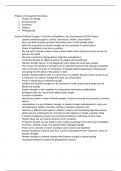Class notes
Political Thought Notes- Phases of Change, Eastern Thought Buddhism and Confucianism, Ancient Greek Thought Socrates, Plato, Aristotle, Roman Republic Thought
- Course
- Institution
Notes on Phases of Change, Eastern Political Thought, Ancient Greek Political Thought, and Roman Republic thought
[Show more]



